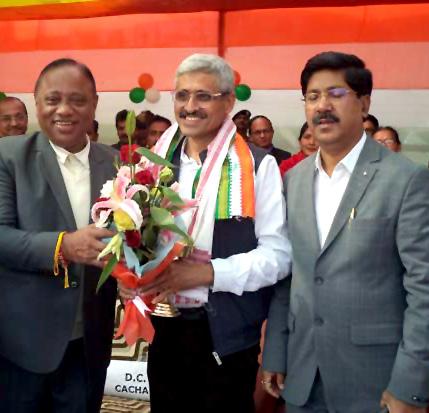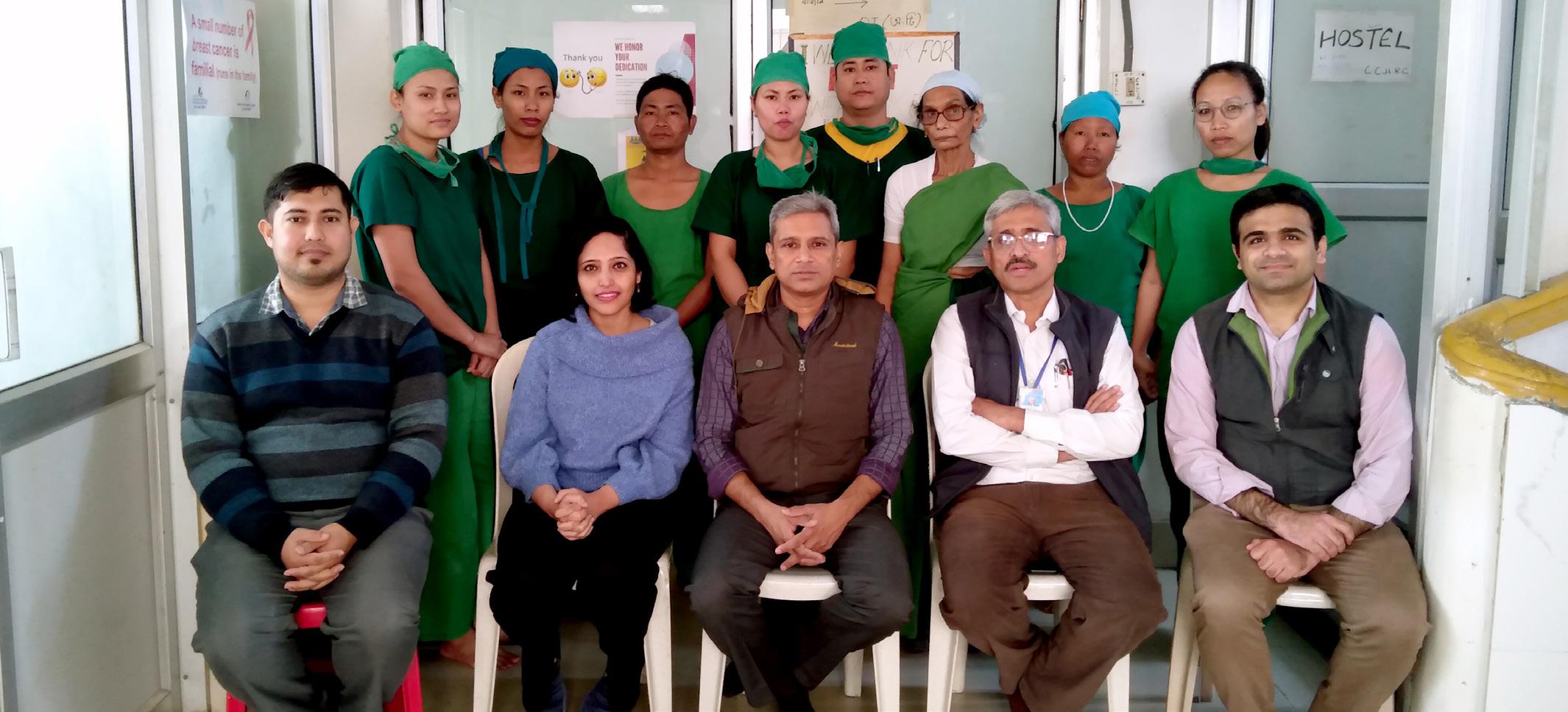
8 minute read
MAKING A DIFFERENCE Dr Ravi Kannan, an oncologist moved to a backward, poverty-stricken area in the north-east to help the poor access healthcare
Spreading Light
in Silchar
Advertisement
A surgical oncologist found his calling when he decided to give up his practice in Chennai and move to work at the Cachar Cancer Hospital in Silchar. Dr Ravi Kannan took up the challenge and found that he could impact the lives of deprived daily wage earners suffering from cancer in Assam. And, for all his hard work and efforts, he was awarded the Padma Shri. Nivedita Choudhuri profiles the doctor, who has brought change in a backward, poverty-stricken area where healthcare is still inadequate
Dr Ravi Kannan’s patients have truly seen one thing more relentless than cancer. The doctor himself. Not only does he give them courage but he also ensures that his patients—mostly poverty-ridden, from one of the most deprived areas in India—do not stop their treatment for fear of missing out on a day’s work and their daily wage. Dr Ravi Kannan, a surgical oncologist, who was awarded the Padma Shri last year for his work, is modest when it comes to accepting any praise though. He gives all the credit to the unstinting support of his entire team at Cachar Cancer Hospital and Research Centre in Silchar, Assam. Of course, since last year, the COVID pandemic has changed everything. “We did not feel the full impact of the pandemic till around May, when the migrant labourers started returning home. So, we had time to prepare ourselves. Drills were carried out for the staff and we equipped ourselves with PPE, masks, aprons, sanitisers, etc. A ward for cancer patients who had contracted COVID-19 was created. Of course, it was difficult for the cancer patients who got the virus and they had to be isolated as a result. There was a patient who just had a tracheostomy done and two other cases of head and neck cancer in the isolation
ward. They were upset as they could not meet their families, but our nurses took good care of them,” said Dr Kannan. “Around 85 cancer patients had the virus.All but one recovered though several had comorbidities such as diabetes. It was challenging because we had to reschedule radiation timetables for the patients. In the last few weeks, there have been no new cases,” he added.
The 56-year-old Dr Kannan was born in Chennai but travelled with his father, who was with the Indian Air Force, all over the country. He grew up in Shillong, New Delhi, Jamnagar, Benaras and Ambala and completed his MBBS degree at Kilpauk Medical College in Chennai, and his MS at Maulana Azad Medical College, New Delhi. He specialised in oncology from the Adyar Cancer Institute in Chennai, where he spent a number of years, before he left in search of new challenges in December 2006. It seemed God had heard his prayers for, out of the blue, he got a call from Dr Chinmoy Choudhury, chairperson at Cachar Cancer Hospital. He invited Dr Kannan to take charge of the centre. But first, Dr Kannan decided to visit Silchar to take stock of the situation. The fact that we live in a world of contrasts became clear to Dr Kannan as soon as he reached Silchar. His eyes took in the natural splendours of Barak Valley and its lush green forests and tea gardens. At the same time, he could not ignore the acute lack of infrastructure and the concentration of poverty in the area.
Cancer patients had to travel around 350 km to Guwahati for treatment. Most of the local people were dailywage earners, who consumed a lot of tobacco, betel nut and alcohol. Instances of mouth cancer, head and neck cancer, oesophageal cancer, lung and gall bladder cancer were rampant. But, they lacked the funds required to travel to Guwahati and so disease and death went hand in hand.
Seetha Lakshmi, too, was deeply moved by the appalling conditions in which the local population lived. Most families lived in homes with leaking roofs and terrible sanitation. Dr Kannan recalls what she told him: “They need us. We must not disappoint them.” They returned to Chennai and Seetha Lakshmi was given the difficult task of informing their families that they were planning to relocate to Assam. Dr Kannan’s colleagues in Chennai believed he was committing professional harakiri. But Assam beckoned and Dr Kannan had found his true calling. From a world of relative comfort, Dr Kannan moved to a world of uncertain power supply and inadequate road connectivity. It was June 2007.
Dr Kannan sees to it that his patients—mostly from one of the most deprived areas in India —do not forego their treatment because they may miss their daily wages by visiting the hospital
However, his wife Seetha Lakshmi, a regional officer in the United States Educational Foundation in India (USEFI) in Chennai was apprehensive about the new job in Assam. She could only think of ‘insurgency and floods’. However, Dr Kannan managed to persuade her to visit Silchar for a weekend trip. Little did they realise that this trip will change “When I started working here, Cachar Cancer Hospital had the lives of their family and the under-privileged community only 23 staff members. Established in 1996, the hospital was in the remote Barak Valley of Assam forever. unable to cater to the needs of the local people. Firstly, there was insufficient staff—we just had six healthcare assistants who doubled as nurses and six cleaners, two technicians but only one doctor! I did not think much before I came here and certainly I did not do a SWOT analysis. And, I ended up spending a lot of time firefighting. My family, which included my daughter, had to do a fair bit of adjusting as well,” recounts the good doctor, who took over as director of Cachar Cancer Hospital. There were plenty of problems in the beginning. The patients were too poor to pay for their treatment and it was difficult to pay the salaries of staff members. The local people were wary of joining the hospital because they knew they can command better salaries in bigger cities. Dr Kannan found that 60 per cent of the patients did not return for a second appointment! Less than 30 per cent of the patients completed their treatment at the hospital. The doctor discovered the reason after some investigation of his own. Most of the patients—around 80 per cent—were dailywage earners, either working in tea plantations or as agricultural workers. They could not afford to forego their earnings for even Dr Ravi Kannan is modest when it comes to accepting praise for all one day by visiting the hospital. A two-pronged strategy was his good work adopted by the hospital to tackle the problem.

Firstly, every patient was sent home with a follow-up date. Secondly, it was decided that employment will be provided to the family members accompanying the patients. The hospital started paying the attendants for watering plants, cleaning the wards or doing other small tasks. Initially, they were paid Rs. 30 and food was also provided. Now, the attendants get food and an amount of Rs. 300.
The situation did not improve overnight. Another audit showed that 55 per cent of the patients had completed their treatment. Dr Kannan points out, “It was encouraging and discouraging at the same time. While the compliance figures had gone up, I realised that Cachar Cancer Hospital was the last stop for treatment for all my patients, who simply could not afford to travel anywhere else. For instance, a cancer hospital in Mumbai may have patients from many states in India. People may come for a diagnosis or an opinion. But, my patients in Silchar have nowhere else to go. So, the 45 per cent of patients who are not returning to me are not getting any treatment at all.” Dr Kannan started home visits to solve this problem. Doctors started going to the villages and the patients were told they do not have to pay for home-based care. Satellite clinics were set up in remote areas and the medics started phone consultations as well. Reminders about future appointments were given to patients and the doctors stayed in touch with patients who had returned home with prescriptions. Patients pay a one-time registration fee of Rs. 500 at the hospital and can avail treatment for a lifetime. This fee is charged to ensure that patients attend follow-up appointments. The few who come from far-off places are also provided accommodation and food.
“We have around 350 staff members, including 10 doctors. There are over 100 beds, which is a huge jump from the initial years when the cancer hospital had only 20 beds. We have around 4,000 new patients annually and another 20,000 come for follow-up appointments,” Dr Kannan says. Patients come from as far as Karimganj, Dima Hasao and Hailakandi (Assam), and from Tripura, Manipur and Mizoram. With all these effective measures in place, the compliance rate has gone up to 70 per cent, reveals the doctor. Other plans include a department of nuclear medicine at Cachar, courtesy a CSR grant by the Airports Authority of India. Individual grants have also poured in. Seetha Lakshmi is also involved in the running of the hospital as a volunteer. She helps with the correspondence, coordinates programmes, compiles reports and communicates with individuals and organisations. Dr Kannan’s Padma Shri win sparked celebrations in both Assam and Tamil Nadu. Though, the doctor is touched by all the accolades, he is not about to be carried away and continues to soldier on. The phrase that springs to mind when you think of him is this: he cannot direct the wind, but he will direct the sails for as long as he can.
“Ravi is an amazing surgeon whose grit, fierce determination, extraordinary passion and tremendous body of work has transformed cancer care in one of the remotest regions in Assam. During my Presidential term at The Association of Surgeons of India (ASI), he was selected to deliver the Col. Pandalai Oration during ASICON 2021 - 81st annual Congress of the Association, to be held in December. This most prestigious Oration instituted in memory of the founder President of ASI, is the highest academic recognition that can be achieved by a surgeon practising in India. I truly believe that ASI has been honoured in honouring him. More power to Ravi.”
Dr P Raghu Ram
President ASI (2020) & Col. Pandalai Orator (2018)





